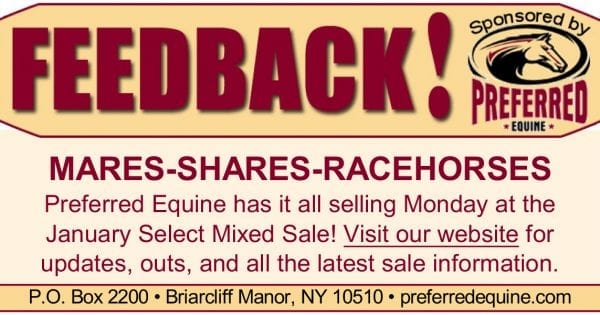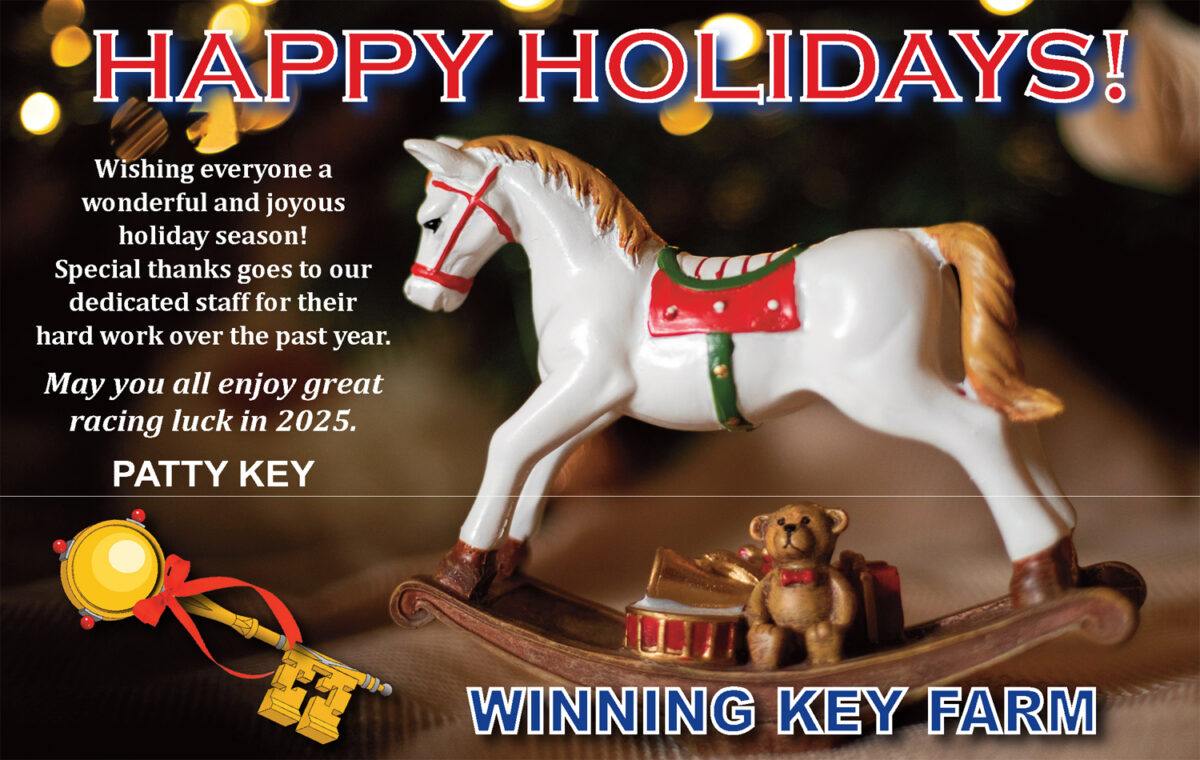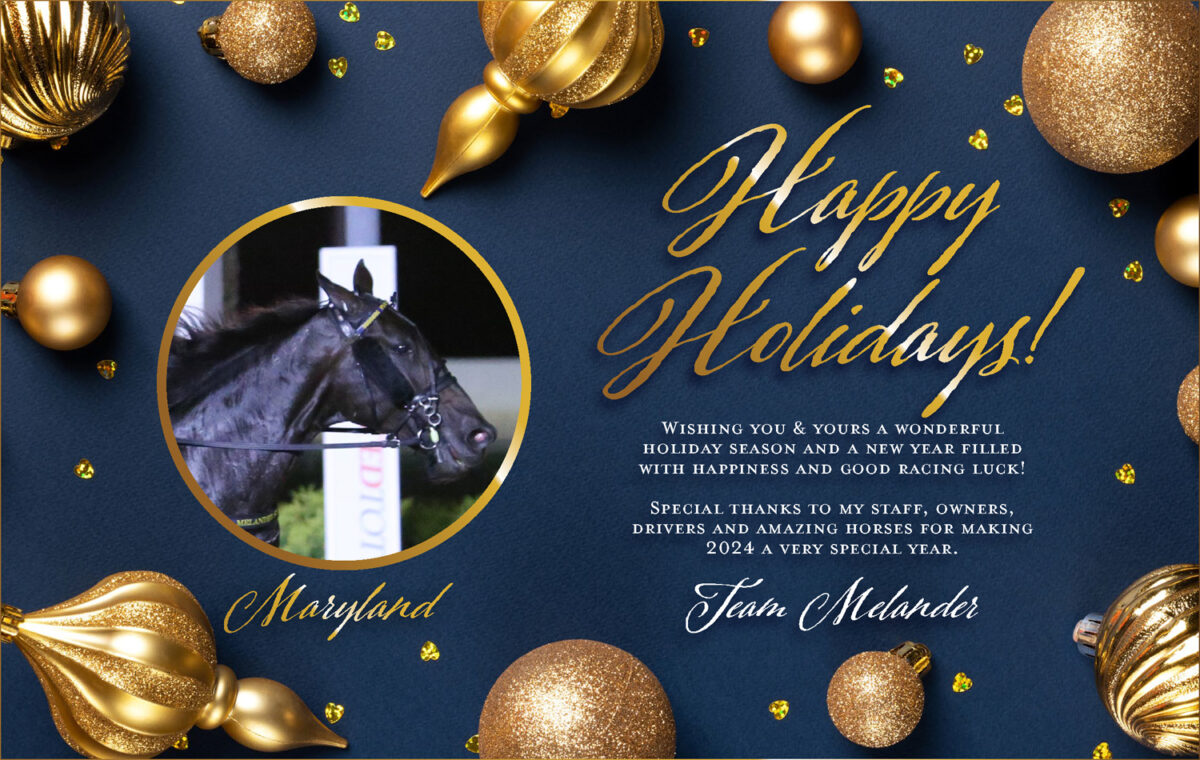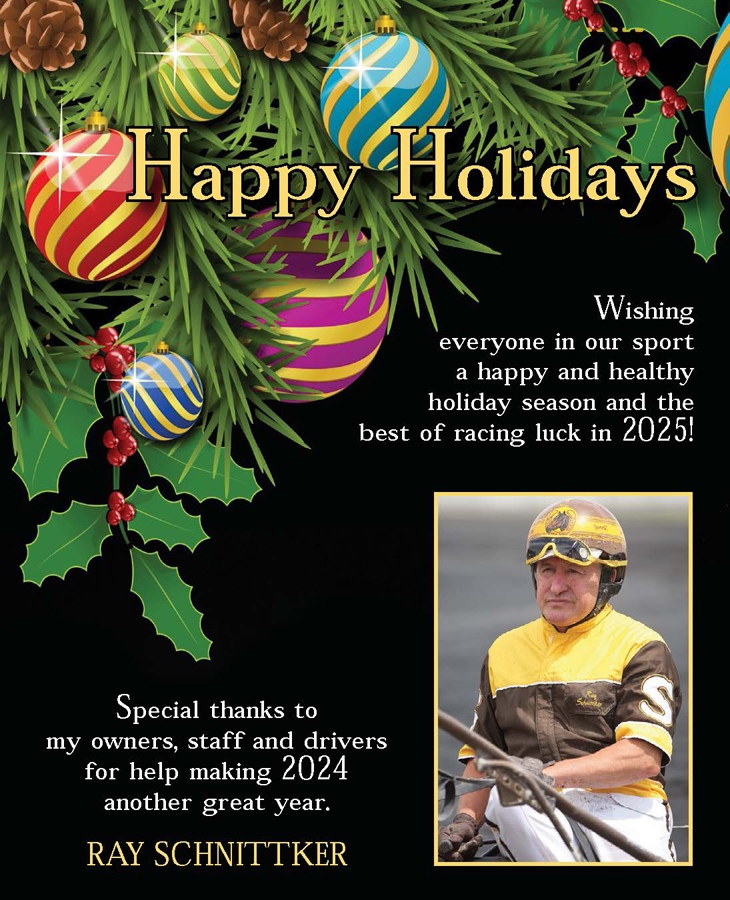

HRU Feedback (2018-01-14)
*Editor’s note: Most of the following letters concerning the new integrity rule being implemented by WEG and the Jeff Gural-owned tracks were written after the original story about the rule was published in last Sunday’s HRU (full story here), but please note the rule is currently being tweaked, in part, due to the feedback WEG received about the original rule. A story on the tweaks can be read here.
Applause for new integrity rule’s interest in protecting horses
Bravo to Clay Horner/WEG for finally putting responsibility on the shoulders of horse owners — where it rightly should be. They run the business. For far too long they have been allowed to get away with bouncing from cheater to cheater without much in the way of meaningful penalty. Lose one horse, but let the others carry on. This new rule out of WEG (in collaboration with Jeff Gural) shows that someone truly gives a damn about the health and welfare of the horses and the integrity of horse racing and puts that in front of the welfare of these cheating owners. It’s about bloody time. I’ve been told so many times by so many horse people that I am far too pessimistic, suspicious and off base in my belief that serious drug use is rampant at the top end of the business. That this issue is “overblown” and that our big name trainers are attacked because of jealously from the ranks below. Hmmm. If that is so, why the much needed rule to stop that is finally coming out of the top tracks in harness racing? Thank you Clay Horner/WEG and Jeff Gural/Big M for showing that horses’ lives do matter and that owners must be held responsible and accountable.
— Lynne Magee / Wingham, ON
Industry needs a culture change
The new rules instituted by WEG and The Meadowlands represent a tiny step in a positive direction. I applaud Jeff Gural for singlehandedly initiating much needed change. The industry needs a culture change.
While the owners of Lady Shadow were forced to change trainers last fall at WEG the former trainer was allowed to race all his other overnight horses. If there was a perceived problem shouldn’t we be protecting the public at all times in all races? Stake races represent such a miniscule percentage of your business. This makes no sense.
Manipulation of the TCO2 level is the single biggest threat to a level playing field. It’s cheap, easy and effective. It’s performance enhancing capabilities rival that of EPO on certain horses. It’s also a little cruel. There are trainers good handicappers know not to bet out of a 24-hour D barn. Just look at some of the past years results. Jog one week no D barn. Flat the next, same trip, D barn. When a new unknown trainer comes along with a .400 average it’s almost always attributable to a power drench-until he/she has an overage then watch the numbers plummet. That brings me to the RMTC/race commissions. I wrote to the RMTC (and never received a response) about this very problem. The level needs to be reduced to stop anyone from even considering its manipulation or the penalty increased. I’ve never had a horse on a blood test show a level over 31 although it’s possible in rare occasions. Why do we allow 37? I realize we need some latitude but why is the RMTC/commissions so obtuse about thresholds and withdrawal times on much needed therapeutics that actually improve the quality of life for the horse but not on the performance enhancing capabilities of an elevated TCO2? Most therapeutics never determined the outcome of a race even in cases of slight overage. All positive tests are not equal.
Perhaps the Meadowlands and WEG could institute a house rule that bars a trainer with an overage, for ANY horse, for a period of one or two years. Problem solved?
Finally concerning post time lag, The Meadowlands and WEG need to show leadership. Both tracks should go to post at the proper time. That way no one has any advantage. In short order, bettors will adjust. It will almost force the other tracks to follow suit so as to not have competing post times. If that fails threaten to drop their signal. Customers will greatly appreciate it and this nonsense can stop for good. P.S. WEG could you please stop the overlap in your win four on 10-race programs. All bettors hate it and its bad policy. You’re one of the few that does this.
— Chris Bush / London, ON
Howard Taylor: horsemen must rally to quash WEG/Big M integrity rule
It seems that the industry is not concerned, but I believe that everyone in harness racing should be up in arms over the recent announcement from the partnership of Jeff Gural and WEG.
For those who live in a cocoon, these entities have announced that they will bar owners of horses from participating at their tracks if one of their horses tests positive for a class 1 or 2 medication, as well as a TCO2 or steroid positive. In this day and age of advanced testing at microscopic, nonperformance enhancing levels, it is non just likely, but probable that many innocents will suffer.
Imagine you were a small time trainer, in the business all your life with marginal success. You finally get the big horse you wanted for all your life. You have him prepped for the Meadowlands Pace or North America Cup. But days before you enter, one of the owners of your horse has a trainer in another state, who you never met, receive a positive for a class 2 substance at 5 Picograms (Billionth of a gram). Your horse is now barred from the race.
How about the big owner with horses in many different barns, with many different partners. A trainer gets a positive with a horse you never heard of, but which is owned by someone whom you have only marginal dealings. You may have never met him (think fractional ownership) BARRED!
You wonder how this is legal as you make your stakes payments faithfully, and the track accepted them. However, the courts have rules that this is legal.
They own the tracks so they can make the Rules. They can even change them on a whim as we have seen them do, when it affects their interests adversely.
They not only believe that they can dictate terms, but also how you can race. I used to own a small part of Lady Shadow. She regularly beat most horses, including one name Solar Sister. Solar Sister is owned by Clay Horner, Chairman of the Board of WEG.
Two weeks before last years Roses Are Red Stake, I received a call from Jaime Martin, the Director of Racing. He told me that he was being pressured to not allow her to participate while she was trained by Ron Adams. He suggested that we switch trainers. I asked if Adams was barred and he acknowledged that Ron regularly raced there.
He indicated that she would likely be barred if Adams trained her at the time of entry. We gave in and switched barns. Incredibly, Ron Adams was allowed to race another horse in the same race.
These people are petty and vengeful. They are intent on ruining the sport they claim to be saving. In his announcement, Clay Horner couldn’t help himself but to cite Lady Shadow as an example of conduct he is seeking to correct. Yet, Lady Shadow was found with an excessive level of Clenbuterol, a Class 3 substance, and thus would not have been affected by the Rule.
Traditionally, horsemen don’t get involved until it affects them or their pockets. This Rules is so far reaching that it likely will affect many. Unfortunately, by then it will be too late.
Horsemen must do something now, before it is too late. We should just refuse to stake horses to races they control. We should avoid the entry box at their tracks. Turn on them before they turn on you. I personally own a lot of horses with many different trainers. Some I have no control over. But, I have asked my trainers to avoid racing at Freehold North (The Meadowlands) when possible.
I have several top caliber horses which will not be staked to races controlled by these egomaniacs. And, if it does affect me personally, I will simply exit the business. Forewarned is forearmed. Horsemen beware!
— Howard Taylor / Philadelphia, PA
Clay Horner responds to Howard Taylor
Howard, I read your letter. The rule as published on Harness Link makes clear that Class 2 offences are two strike offences for owners and accordingly your example is wrong. For the record, Solar Sister did not race against Lady Shadow on any occasion in 2017 and she is retired and being bred to Always B Miki.
We do agree that the rule is legal.
It has been a pleasure to speak with many of our most significant owners and trainers today and learn of their support and willingness to be publicly identified as being in support. Many of them expressed dismay at your choice of many of your trainers from an integrity perspective. While we welcome your participation in our stakes program, it will carry on in the event you choose not to participate. I would hope that your high risk profile and petulant comments would not result in your better partners missing the opportunity to participate in many of our sport’s best and richest stakes events.
— Clay Horner / chairman Woodbine Entertainment Group
Bill Donovan applauds integrity rule
I applaud the bold move by The Meadowlands and Woodbine Entertainment in their efforts to clean up the sport. First and foremost, this should be perceived as seeking to establish a major deterrent to trainers who are using illegal means to win purse money. I have read posts all over social media, from those in support of this plan to those chickens claiming this will cause the sky to fall. If a trainer abides by the rules and isn’t being a chemist, then his or her stable owners have no reason to be concerned. The one hole in the plan is when “innocent” partners are affected. If an owner has horses with Trainer “A” and that trainer gets a positive, I think it unfair to that owner’s partners who he may have horses with in other stables, to be penalized by barring the horse from these races.
My suggestion is for the Meadowlands and Woodbine to establish a “Harness Racing Integrity Fund” which would use its assets to support efforts to level the playing field for all participants in our sport.
Then, when that owner has “innocent” partners with other trainers, allow the horse to race but make the owner forfeit his share of earnings and commit them instead to this fund. I think this still reaches the prime objective of the plan and does not adversely affect partners who have no relationship with the offending trainer.
The hullabaloo this proposal has instigated has clearly put the spotlight on some real problems that need to be addressed. Uniform drug rules and testing are absolutely mandated and are long overdue. The horsemen associations and tracks in every state and province should convene a meeting to determine what proposal they can put together and then singularly solicit the support of their own Commission while jointly seeking a meeting with Racing Commissioners International to secure the proposals implementation in every jurisdiction. The initiative has to come us in the sport and I think it would be well received and open a dialogue to finally get something done.
No one is more adamant about owner responsibility than I am. However, do we offer owners, especially prospective owners, free and easy access to all information for every trainer? Anyone should be readily able to access every trainer’s performance and history of fines and penalties on both the USTA and Standardbred Canada websites, at no charge. If we expect an owner to be responsible, then we must provide them with as much information as possible to help in the trainer selection process.
— Bill Donovan / Delray Beach, FL
Sport has many problems to tackle
As a participant in this industry for the better part of my 36 years on this earth (I started scrubbing buckets and washing boots when I was 4), I can tell you horseman are a jealous, fickle bunch of people. Yes, there are many genuine good-hearted people in our industry. Many are sincere and jovial and hardworking, but we are also competitive. We compete to make a living. Competing drives some people to look for advantages. It happens in all major sports, in every level of competition. From little league and pop warner football straight up through the professional ranks. Why would our sport be any different?
The most recent efforts being made by (WEG and the Big M) to ensure the integrity of the harness racing industry are all well and good, but let’s face it, it far from fixes the problem. We must first be completely transparent about what hinders our industry before we can start making rules to try and fix it. The harness racing industry has been plagued with black eyes and scandals that lead people outside our industry wondering why they should even give it a second glance. Our fan base is dwindling rapidly, our bettors are leaving in droves and the owners are beginning to look for other investment opportunities.
What have we done to remedy any of these problems? The first attempt was simulcasting. We sold our soul to keep bettors gambling on our product. We decided it was a great idea to let the betting public stand in small, drab establishments and gamble on our horses instead of coming to our venues to do it. Oh, and we’ll give these establishments a huge piece of the handle to accommodate our bettors. Who thought that was a good business model besides OTB and Roberts Communications? So, after years of allowing our fans and bettors the opportunity to avoid coming in person to watch and wager, we needed flashy new enticements to get them through the doors. SLOTS! Slots at the tracks will bring people in the doors. We’ll allow casinos and track owners to put slot machines, or Video Lottery Terminals (as they are called in the legislation in New York) to draw patrons to the tracks. Years of increasing state lotteries and Indian casinos has been one of the downfalls of our industry and then we decided to just put them in our facilities. Again, we only get a fraction of the proceeds, but at least people are coming back to the track. Walk into almost all the VLT parlors/casinos in the industry and see if anyone can tell you where the racetrack is — it’s like trying to find a needle in a haystack. We’ve gotten people back to the track, except they don’t even realize it’s a racetrack. This worked for a while until the governments realized they could just have the slots without the horses. Canada was one of the first jurisdictions to have the benefit of slots, but it was also the first jurisdiction to be crippled by it as well. Now that we all got a wake-up call to what could really happen our industry we decided to try and figure out a long-term solution. What will that solution be? Marketing? Advertising? Sponsorships? Social Media campaigns? Cleaning up our drug riddled industry? Here lies one of the major problems in our sport, drugging to gain an advantage. It is also one of the most confusing and ambiguous aspects of our sport. These solutions take one thing our industry fears, CHANGE.
We have no universal governing body that determines competition rules pertaining to what drugs are allowed and what drugs are deemed unacceptable, like the MLB, NFL, or NBA — or any other professional sport. Rules vary from state to state even for drugs that are deemed acceptable, such as Lasix. Lasix in one state is given 4 hours prior to competition, in another state it is given 3 hours prior to competition. Same drug, different rules. Same goes for Bute, you can race on it day of the race in Massachusetts, but in other states you must administer at least 24 hours prior to race day. Some trainers have decided to push the limits of drug testing and continue to look for new and improved drugs to gain competitive advantages. They win more races, they make more money, they get more owners and the owners buy more horses. It’s a fact.
To change that cycle we need to not only improve our drug testing, we need to improve the penalties that go along with these violations. These changes are meant to improve the integrity of the sport, but the integrity needs to be improved across the board. From racing commissions to racetrack owners to horse owners, to trainers and drivers, complete transparency should be the goal. Judges and racing commissions are supposed to protect the betting public. That’s laughable. They are gamblers; if you want to protect them, give them a rock-solid set of rules that are abided by at every track. That’s the protection they should have. It’s like playing blackjack. It is an industry standard that 17 is a hand that dealers stand on. Yes, there are some exceptions on how they get to it, but 17 is the number. We have racetrack owners preaching integrity and throwing trainers out of their tracks because they have had positive tests. But the same racetrack owner casts a blind eye when it comes to a business partner that gets a positive. Why isn’t the racing commission or USTA protecting the betting public from that scenario?
Jurisdictions have made rules to suspend trainers and horses with positive tests which I believe is a step in the right direction. The new rules which they want to put into place suspending owners as well is, in my opinion, going to far. In this day in age, where owners are buying big ticket yearlings in partnership groups, it seems detrimental to take this step.
The industry has in the last few years made an attempt to become more “Owner Forward”. The USTA has been pushing owner seminars, fractional ownership groups have become a growing trend; owners are being encouraged to have their own personal owner colors worn in high dollar stakes events. How is suspending owners going to help any of those situations? It’s basically a ploy by certain tracks to stop owners from putting horses in trainers barns they deem undesirable. Why stop with owners? Why not include the drivers of horses who test positive on post-race tests? It is being claimed that it’s the owner’s fiduciary responsibility to put horses in the barns of trainers who don’t drug their horses. Why isn’t it the driver’s fiduciary responsibility to not drive for trainers who are know drug offenders? Having been a catch driver, I know first hand that drivers have the ability to choose who they drive for. They could very easy not drive for the known drug-using trainers. However, being that our livelihood is based on driving horses that make money, we choose to drive the drugged horses. Why? Because if we don’t there will be someone else who will. Remember, we are a fickle group. A horse tests positive, the owner, trainer, and the driver must return the money they made. Why then does the driver get absolved for any suspension in these new rules? They made the choice to drive for that trainer just as the owner made the choice to put the horse in that trainer’s barn. Our industry is performance based, the better you preform, the more opportunities you get.
The rules in our industry aren’t helping to fix the integrity in our sport. Strip it down to the base and work out the problems. Start with a governing body that has clout when it comes to rules, not just keeping records. Work with state racing commissions to develop a universal rulebook. Make fines and suspensions high dollar amounts and multiple years, not a couple hundred dollars or 10 to 15 days. We worry about shadow trainers. How about making it harder to get a trainer’s license? Any Tom, Dick or Harry can order the trainers guide, get a few signatures and presto, they have a trainer’s license. Institute year long apprenticeships before getting licensed. In order to get a driver’s license, you need to have a certain number of qualifying drives. An apprenticeship would work in the same way. Make trainers go through re-evaluations to keep their license. Make other practicals besides going a mile in 2:25. Most people used to have to work their way up in this business; now all you have to do is be willing to put your name down as a beard to get a barnful of horses. We are focusing solely on drugs as a detriment to the animals, but it is not the only problem: lack of knowledge in the advancement of feeds, veterinary care, and rehabilitation and training methods are just as big of a detriment to the horse. Shouting from the rooftops that we need to fix the integrity of our sports isn’t working. These new rules coupled with the flawed system are basically putting lipstick on Miss Piggy and trying to pass her off as Marilyn Monroe.
We need to come to grips with fact that our industry is basically a classic car. It was the “be all and end all” at one point in time. People came to the tracks for entertainment because there wasn’t much else to do. That time has passed, and we need to reinvent ourselves to the current society where people need to have their attention stimulated more frequently and in new exciting ways. People are still interested in classic cars, but they need to be renovated and reconditioned at grab people’s attention again. Fixing our industry is much like refinishing a classic car, you need to strip it down to its bare bones and start with the frame. Making new rules and regulations works for a bit, but it’s basically like slapping bondo on a dent in a fender and covering it in cheap paint — people can tell it’s a quick fix and it doesn’t add to the integrity of the car. As an industry, from the USTA president and directors all the way down to the grooms, we need to work together to look at what we have; be transparent about it, and start fixing it. Let’s face it, everyone stops and stares at the showroom quality, cherry red vintage Corvette that drives down the road. Maybe we need to stop using bondo and start using elbow grease to fix the dents and give people something to be in awe of.
— Brian Connor / Goshen, NY
Integrity rule shouldn’t circumvent racing commissions
I read your article in HRU in regards to the WEG and Meadowlands collaboration on penalties for Class 1, 2 positives.
I understand what those two companies are trying to do, but at the same time see a problem with them circumventing rules put in place by the governing body AGCO.
The one rule in chapter 6 where it basically says you have to transfer to another trainer for your horse to race in the event of a positive test.
IMO, it’s a slippery slope when we allow private companies to start circumventing rules already in place and will open the above problem to litigation.
IMO, WEG and Gural should be working with AGCO to rewrite/massage the rules already in place.
I for one think we need one NA Racing Commission that governs racing.
Also, testing needs to be done by an outside party that has no attachment to racing.
Gural has a habit of being involved in the process which screams impropriety as he has horses with trainers that have had issues.
Also, there doesn’t seem to be a lot of transparency of late when it comes to positive tests in both Canada and the US. Example being about a year ago all the Glaucine positives for one.
— Bob Boyd / La Salette, ON















